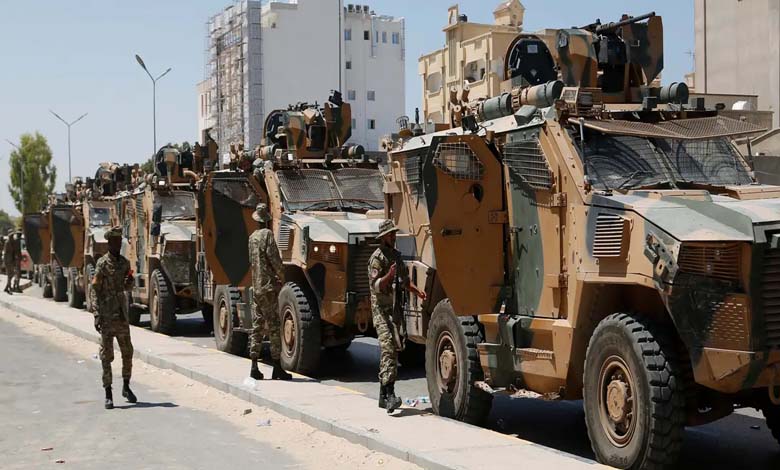Renewed Military Buildup in Tripoli Raises Fears of New Clashes

The United Nations Support Mission in Libya (UNSMIL) has warned of the consequences of escalating tensions in the capital, urging all parties to refrain from actions or rhetoric that could increase instability, and calling for the immediate withdrawal of recently deployed forces in Tripoli.
-
Violence erupts in Tripoli after protesters opposing Dbeibeh are dispersed
-
UN and Regional Efforts to Contain Tensions in Tripoli
The Libyan capital is witnessing rising tension due to rapid military mobilizations in several districts, just days after a strongly worded speech by Prime Minister Abdulhamid Dbeibah, in which he threatened military action against his rivals—including armed groups that were once part of his own security alliances—despite a prior agreement to remove armed factions from residential areas.
Despite months of efforts by both local and international actors to de-escalate tensions, the specter of renewed armed conflict now looms over Tripoli, raising concerns of a return to violent clashes between competing factions.
-
The Smoke of Tripoli Clashes Still Rises: Political Economic and Security Repercussions
-
Gheniwa’s Blood Strangles Dbeibah… Tripoli’s Nero Burns in His Own Fire
The current escalation followed Dbeibah’s controversial speech, in which he accused so-called “irregular militias” of plotting an armed coup, reportedly using advanced weaponry that surpasses the capabilities of the official government forces. He hinted at launching a “comprehensive security campaign” if these groups failed to comply with what he called the “conditions of the state,” implying a need for subordination to central authority.
Hours after his remarks, security sources in Tripoli reported unusual military activity, including the deployment of heavy vehicles and the positioning of armed units in sensitive areas such as Salah al-Din, Ain Zara, and the Airport Road district.
-
Protests in Tripoli Call for Dbeibah and His Government to Step Down
-
Militia Arms Chaos Reignites Violence Spiral in Tripoli
On Wednesday, UNSMIL issued an official statement warning against further escalation and calling on “all parties to refrain from actions or rhetoric that could increase tensions,” demanding the immediate withdrawal of newly deployed troops. The mission emphasized its continued efforts to maintain calm, protect civilians, and encourage military and political leaders to engage in de-escalation with sincerity. It warned that “continued military buildup threatens the capital’s security and the stability of the entire country.”
This security crisis comes amid growing public and political pressure on Dbeibah to step down, fueled by his government’s failure to hold the promised elections and by the worsening economic and living conditions, along with a surge in violent incidents and lawlessness.
-
Heavy Clashes in Tripoli After the Killing of a Militia Leader Affiliated with the Presidential Council
-
Armed Clashes in Tripoli Reveal Fragility of Security Situation
Observers suggest that Dbeibah‘s recent moves may not only target militias, but also carry political undertones aimed at diverting attention from rising calls for his removal, and at avoiding the launch of a political transition that could lead to the formation of a new unified executive.
Libya’s political process remains paralyzed, with institutions divided between east and west. The international community, including the UN and the European Union, has repeatedly warned of the risk of slipping back into civil war.
-
Washington Denies Training Armed Groups in Tripoli under Agreement with Dbeibeh
-
Clashes Between Militias in Tripoli Mar Eid Atmosphere
Human rights activists caution that continued military escalation could reignite deadly confrontations, similar to those that occurred in Tripoli when clashes between two major forces in western Libya killed eight civilians and caused extensive destruction.
Many analysts believe the current military activity is less about responding to an imminent threat and more about Dbeibah reasserting his political leverage through force, as his popular support wanes and international backing gradually erodes.
-
Complications Hindering the Evacuation of Militias from Tripoli
-
Analyst Reveals the Beneficiary Behind the Clashes in Tripoli
Recently, Tripoli had experienced relative calm following an agreement between the Government of National Unity and the Presidential Council to distance armed groups from sovereign institutions and to unify the security command structure. However, the resurgence of military deployments now threatens to derail that fragile accord and could undermine any future national dialogue or efforts to create an environment conducive to long-awaited elections.












